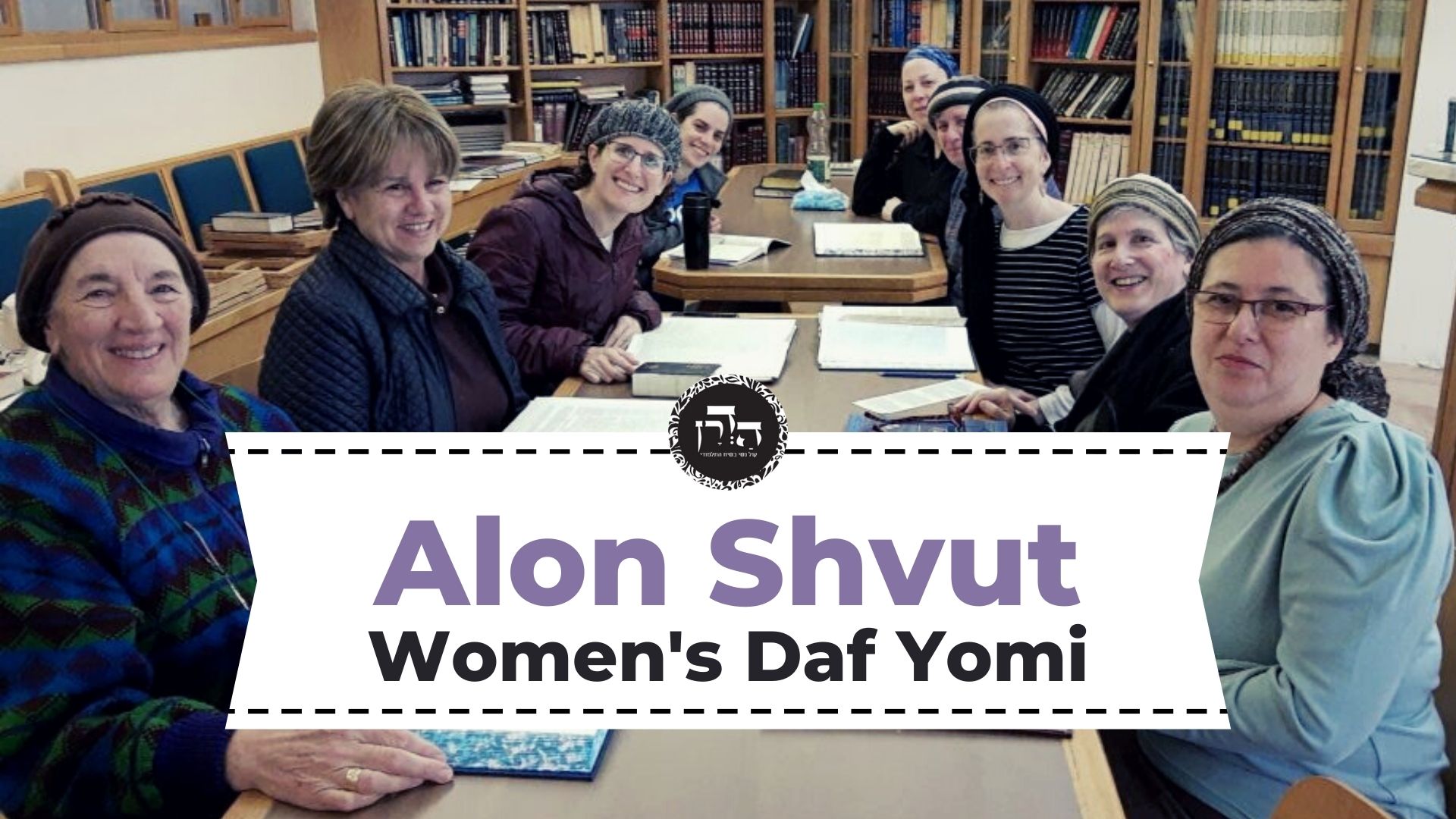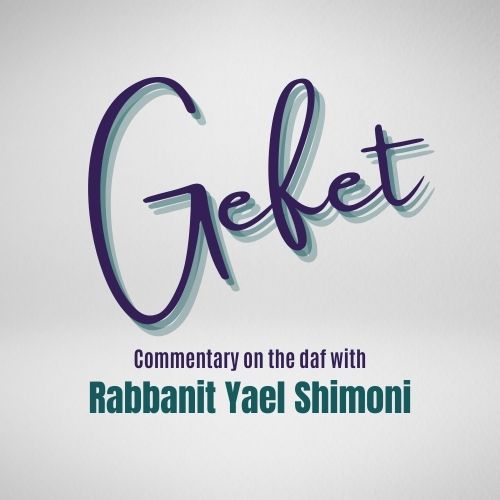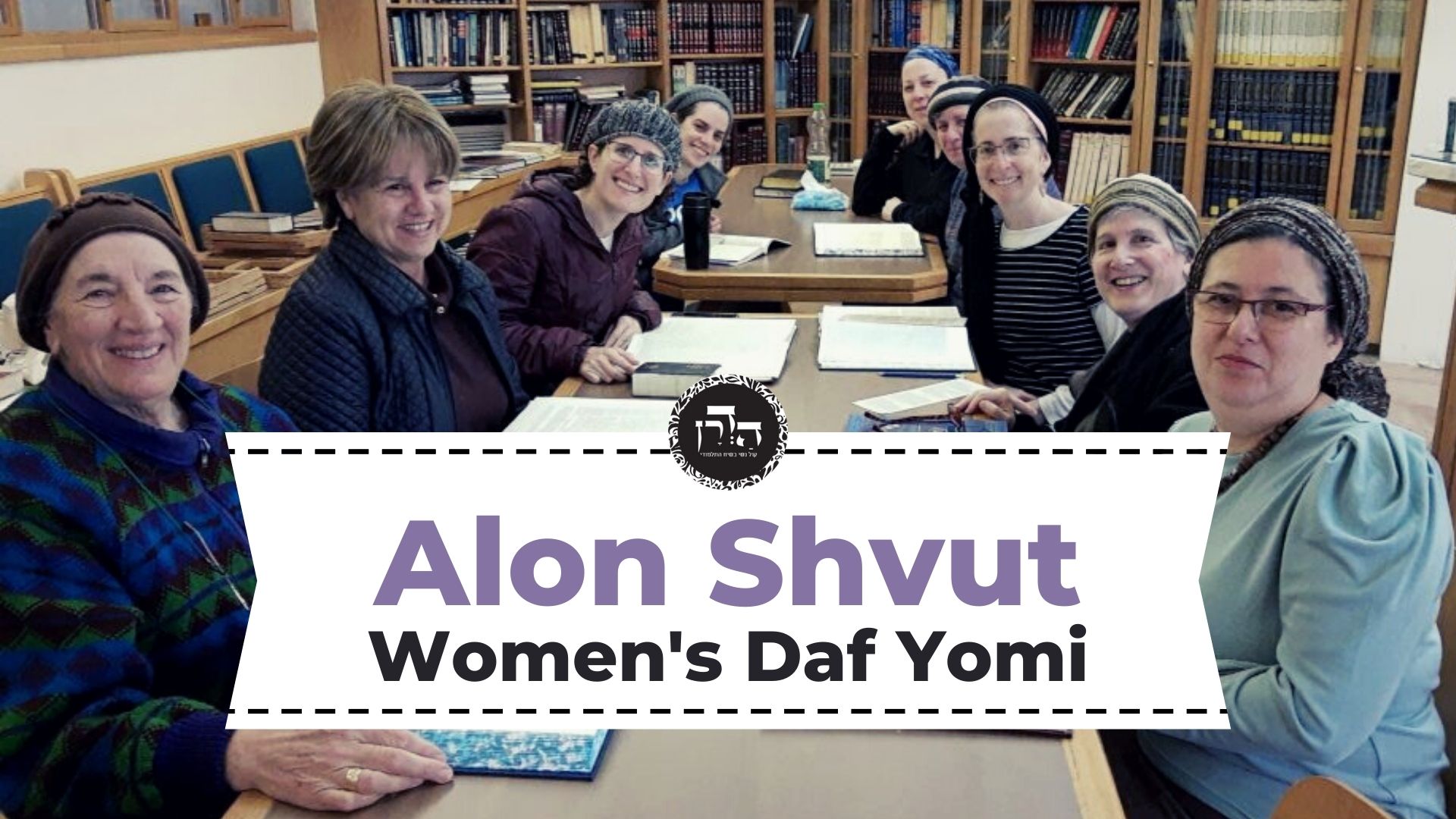What items can one dedicated as “cherem”? One can dedicate only part in each category but not all one owns in that category. There is a debate whether one can give more than 1/5 of one’s possessions to charity. Where does one’s cherem go – to the priests or to the Temple? One cannot redeem an item that one said is cherem. Can pirests and levites make an item cherem? Is there a difference regarding that question between land and moveable items. In a case where cherem goes to the priest, can one choose which priest or does it go to the priests working in the Temple that week?
This week’s learning is sponsored for the merit and safety of Haymanut (Emuna) Kasau, who was 9 years old when she disappeared from her home in Tzfat two years ago, on the 16th of Adar, 5784 (February 25, 2024), and whose whereabouts remain unknown.
This week’s learning is dedicated of the safety of our nation, the soldiers and citizens of Israel, and for the liberation of the Iranian people. May we soon see the realization of “ליהודים היתה אורה ושמחה וששון ויקר”.
Want to dedicate learning? Get started here:


Today’s daily daf tools:
This week’s learning is sponsored for the merit and safety of Haymanut (Emuna) Kasau, who was 9 years old when she disappeared from her home in Tzfat two years ago, on the 16th of Adar, 5784 (February 25, 2024), and whose whereabouts remain unknown.
This week’s learning is dedicated of the safety of our nation, the soldiers and citizens of Israel, and for the liberation of the Iranian people. May we soon see the realization of “ליהודים היתה אורה ושמחה וששון ויקר”.
Today’s daily daf tools:
Delve Deeper
Broaden your understanding of the topics on this daf with classes and podcasts from top women Talmud scholars.
New to Talmud?
Check out our resources designed to help you navigate a page of Talmud – and study at the pace, level and style that fits you.
The Hadran Women’s Tapestry
Meet the diverse women learning Gemara at Hadran and hear their stories.
Arakhin 28
הֵיכִי דָּמֵי? דַּאֲמוּר בְּעֶשְׂרִים וְאֶחָד — הַבְּעָלִים קוֹדְמִין, וְאִם לָאו — אוֹמֵר לוֹ: הִגַּעְתִּיךָ.
What are the circumstances of such an offer? It is in a case where the owner initially said he would purchase the field for twenty-one sela. In such an instance, the additional one-fifth amounts to five sela and one dinar, which means that the total payment of the owner is twenty-six sela and one dinar, greater than the offer of the other person. Accordingly, the owner takes precedence, and when the one-fifth is added to the twenty-six sela offer of the other person, the total price paid by the owner is equal to thirty-one sela and one dinar. And if the payment of the owner does not exceed the offer of the other person even when accounting for the additional one-fifth, then the treasurer says to the other person: The field has come into your possession.
מַתְנִי׳ מַחֲרִים אָדָם מִצֹּאנוֹ וּמִבְּקָרוֹ, וּמֵעֲבָדָיו וּמִשִּׁפְחוֹתָיו הַכְּנַעֲנִים, וּמִשְּׂדֵה אֲחוּזָּתוֹ, וְאִם הֶחְרִים אֶת כּוּלָּם אֵינָם מוּחְרָמִים, דִּבְרֵי רַבִּי אֱלִיעֶזֶר. אָמַר רַבִּי אֶלְעָזָר בֶּן עֲזַרְיָה: מָה אִם לַגָּבוֹהַּ אֵין אָדָם רַשַּׁאי לְהַחְרִים כׇּל נְכָסָיו, עַל אַחַת כַּמָּה וְכַמָּה שֶׁיְּהֵא אָדָם חָס עַל נְכָסָיו!
MISHNA: A person may dedicate, for sacred or priestly use, some of his flock and some of his cattle, and some of his Canaanite slaves and maidservants, and some of his ancestral field. But if he dedicated all that he has of any type of property, they are not dedicated, i.e., the dedication does not take effect; this is the statement of Rabbi Eliezer. Rabbi Elazar ben Azarya said: If for the Most High a person may not dedicate all his property, it is all the more so the case that a person should spare his property and not give all of it to others.
גְּמָ׳ מְנָא הָנֵי מִילֵּי? דְּתָנוּ רַבָּנַן: ״מִכׇּל אֲשֶׁר לוֹ״ — וְלֹא כׇּל אֲשֶׁר לוֹ, ״מֵאָדָם״ — וְלֹא כׇּל אָדָם, ״מִבְּהֵמָה״ — וְלֹא כׇּל בְּהֵמָה, ״מִשְּׂדֵה אֲחוּזָּה״ — וְלֹא כׇּל שְׂדֵה אֲחוּזָּה.
GEMARA: The Gemara asks: From where are these matters, stated in the mishna, derived? The Gemara explains that this is as the Sages taught in a baraita, with regard to the verse: “Notwithstanding, no dedicated thing that a man may dedicate to the Lord of all that he has, whether of man or animal, or of his ancestral field” (Leviticus 27:28). The verse indicates that one may dedicate “of all that he has” but not all that he has; likewise “of man” but not every man, i.e., not every slave of his; “of man or animal” but not every animal of his; and finally one may dedicate “of his ancestral field” but not all of his ancestral field.
יָכוֹל לֹא יַחְרִים, וְאִם הֶחְרִים יְהוּ מוּחְרָמִין? תַּלְמוּד לוֹמַר: ״אַךְ״, דִּבְרֵי רַבִּי אֱלִיעֶזֶר. אָמַר רַבִּי אֶלְעָזָר בֶּן עֲזַרְיָה: מָה אִם לַגָּבוֹהַּ אֵין אָדָם רַשַּׁאי לְהַחְרִים כׇּל נְכָסָיו, עַל אַחַת כַּמָּה וְכַמָּה שֶׁיְּהֵא אָדָם חָס עַל נְכָסָיו!
It might have been thought that one may not dedicate all his properties ab initio, but if he did dedicate all of them, they should be dedicated. Therefore the verse states: “Notwithstanding,” to teach that they are not dedicated. This is the statement of Rabbi Eliezer. Rabbi Elazar ben Azarya said: If for the Most High a person may not dedicate all his property, it is all the more so the case that a person should spare his property and not give it all to others.
וּצְרִיכָא, דְּאִי כְּתַב רַחֲמָנָא ״מִכׇּל אֲשֶׁר לוֹ״, הֲוָה אָמֵינָא: כֹּל דְּאִית לֵיהּ לָא לַחְרֵים, אֲבָל מִין אֶחָד לַיחְרְמֵיהּ כּוּלֵּיהּ, כְּתַב רַחֲמָנָא ״מֵאָדָם״ — וְלֹא כׇּל אָדָם.
The Gemara notes: And it is necessary to derive this halakha with regard to all the categories in the verse. As, if the Merciful One had written only: “Of all that he has,” I would say that one may not dedicate all that he has, but let him dedicate all of one type of property. Therefore, the Merciful One writes “of man,” to teach that he may not dedicate every man.
וְאִי כְּתַב רַחֲמָנָא ״מֵאָדָם״, דְּלָא סַגִּיא לֵיהּ בְּלָא עֲבוֹדָה, אֲבָל שָׂדֶה — סַגִּיא לֵיהּ בְּדִיסְתּוּרָן. וְאִי אַשְׁמְעִינַן הָנֵי תַּרְתֵּי, מִשּׁוּם דְּהָכָא חִיּוּתָא וְהָכָא חִיּוּתָא, אֲבָל מְטַלְטְלִין — לַיחְרְמִינְהוּ כּוּלְּהוּ, צְרִיכִי.
And if the Merciful One had written only: “of man,” one might say that he may not dedicate all of his slaves, as it is not possible for him to be without a slave to perform his work; but with regard to a field, it is possible for him to maintain a livelihood by sharecropping [distoran]. And if the Torah had taught this halakha with regard to only these two types, i.e., ancestral fields and slaves, one might say these may not be dedicated in their entirety because here there is livelihood and here there is also livelihood. But in the case of movable property, on which maintaining a livelihood does not depend, let him dedicate all of them. Therefore, all of these derivations are necessary.
״בְּהֵמָה״ לְמָה לִי? לְכִדְתַנְיָא: יָכוֹל יַחְרִים אָדָם בְּנוֹ וּבִתּוֹ, עַבְדּוֹ וְשִׁפְחָתוֹ הָעִבְרִיִּים, וּשְׂדֵה מִקְנָתוֹ? תַּלְמוּד לוֹמַר: ״בְּהֵמָה״, מָה בְּהֵמָה יֵשׁ לוֹ רְשׁוּת לְמוֹכְרָהּ, אַף כֹּל שֶׁיֵּשׁ לוֹ רְשׁוּת לְמוֹכְרָהּ.
The Gemara further asks: Why do I need for the verse to state “or animal”? The Gemara explains it is necessary for that which is taught in a baraita: One might have thought a person can dedicate his son or his daughter, his Hebrew slave or maidservant, or his purchased field. Therefore, the verse states “animal” to teach that just as an animal is an item that he has permission to sell, so too, one can dedicate any item that he has permission to sell. He cannot dedicate an item that he does not have the ability to sell.
וַהֲלֹא בִּתּוֹ קְטַנָּה יֵשׁ לוֹ רְשׁוּת לְמוֹכְרָהּ, יָכוֹל יַחְרִימֶנָּה? תַּלְמוּד לוֹמַר: ״בְּהֵמָה״, מָה בְּהֵמָה יֵשׁ לוֹ רְשׁוּת לְמוֹכְרָהּ לְעוֹלָם, אַף כֹּל שֶׁיֵּשׁ לוֹ רְשׁוּת לְמוֹכְרָהּ לְעוֹלָם.
The baraita continues: But in the case of his minor daughter, he has permission to sell her as a Hebrew maidservant. If so, one might have thought he may dedicate her. Therefore, the verse states “animal,” indicating that just as an animal is an item that he always has permission to sell, so too, one can dedicate any item that he always has permission to sell, whereas one may not sell his daughter once she reaches majority. A field as well can be sold only until the Jubilee Year.
אָמַר רַבִּי אֶלְעָזָר בֶּן עֲזַרְיָה: אִם לַגָּבוֹהַּ אֵין אָדָם רַשַּׁאי כּוּ׳. הַיְינוּ תַּנָּא קַמָּא!
§ The mishna teaches that Rabbi Elazar ben Azarya said: If for the Most High a person may not dedicate all his property, it is all the more so the case that one should spare his property and not give it all to others. The Gemara raises a difficulty: This is identical to the opinion of the first tanna, i.e., Rabbi Eliezer, who prohibits the dedication of all one’s property.
אִיכָּא בֵּינַיְיהוּ דְּרַבִּי אִילָא, דְּאָמַר רַבִּי אִילָא: בְּאוּשָׁא הִתְקִינוּ, הַמְבַזְבֵּז אַל יְבַזְבֵּז יוֹתֵר מֵחוֹמֶשׁ.
The Gemara responds: There is a practical difference between them with regard to the statement of Rabbi Ila, as Rabbi Ila said: In Usha the Sages instituted that one who dispenses his money to charity should not dispense more than a fifth. Rabbi Eliezer, who did not state that one should spare his property, rules that one may give all his money to charity, provided he keeps a small portion for himself, whereas Rabbi Elazar ben Azarya maintains that one should not give more than a fifth.
מַעֲשֶׂה בְּאֶחָד שֶׁבִּקֵּשׁ לְבַזְבֵּז יוֹתֵר מֵחוֹמֶשׁ, וְלֹא הִנִּיחוּ לוֹ חֲבֵרָיו. וּמַנּוּ? רַבִּי יְשֵׁבָב, וְאָמְרִי לַהּ: רַבִּי יְשֵׁבָב, וְלֹא הִנִּיחוּ לוֹ חֲבֵירָיו. וּמַנּוּ? רַבִּי עֲקִיבָא.
The Gemara relates that there was an incident involving a certain individual who sought to dispense more than a fifth of his property as charity, and his friend did not let him act upon his wishes. And who was this friend? It was Rabbi Yeshevav. And some say it was Rabbi Yeshevav who wanted to give too much charity, and his friend did not let him do so. And who was the friend? It was Rabbi Akiva.
מַתְנִי׳ הַמַּחְרִים בְּנוֹ וּבִתּוֹ, וְעַבְדּוֹ וְשִׁפְחָתוֹ הָעִבְרִים, וּשְׂדֵה מִקְנָתוֹ — אֵין מוּחְרָמִין, שֶׁאֵין אָדָם מַחְרִים דָּבָר שֶׁאֵינוֹ שֶׁלּוֹ. הַכֹּהֲנִים וְהַלְוִיִּם אֵין מַחְרִימִין, דִּבְרֵי רַבִּי יְהוּדָה. רַבִּי שִׁמְעוֹן אוֹמֵר: הַכֹּהֲנִים אֵין מַחְרִימִין — שֶׁהַחֲרָמִין שֶׁלָּהֶן, וְהַלְוִיִּם מַחְרִימִין — שֶׁאֵין הַחֲרָמִין שֶׁלָּהֶן.
MISHNA: In the case of one who dedicates his son or his daughter, or his Hebrew slave or maidservant, or his purchased field, those items are not considered dedicated, as a person may not dedicate an item that is not his. Priests and Levites may not dedicate their property; this is the statement of Rabbi Yehuda. Rabbi Shimon says: Priests may not dedicate their property, as all dedicated property is theirs; it is one of the priestly gifts, as the verse states: “Everything dedicated in Israel shall be yours” (Numbers 18:14). But Levites may dedicate their property, as dedicated property is not theirs.
אָמַר רַבִּי: נִרְאִין דִּבְרֵי רַבִּי יְהוּדָה בְּקַרְקָעוֹת, שֶׁנֶּאֱמַר: ״כִּי אֲחֻזַּת עוֹלָם הִיא לָהֶם״, וְדִבְרֵי רַבִּי שִׁמְעוֹן בְּמִטַּלְטְלִין, שֶׁאֵין הַחֲרָמִין שֶׁלָּהֶן.
Rabbi Yehuda HaNasi said: The statement of Rabbi Yehuda appears to be correct with regard to land, as it is stated about the land of the Levites: “But the fields of the open land surrounding their cities may not be sold, as that is their perpetual possession” (Leviticus 25:34), and they cannot renounce that land. And the statement of Rabbi Shimon appears to be correct with regard to movable property, which the Levites may dedicate, as dedicated property is not theirs. It is a gift for the priests, not the Levites.
גְּמָ׳ וְרַבִּי יְהוּדָה, בִּשְׁלָמָא כֹּהֲנִים אֵין מַחְרִימִין — שֶׁחֲרָמִין שֶׁלָּהֶן, אֶלָּא לְוִיִּם, בִּשְׁלָמָא מְקַרְקְעֵי לָא מַחְרְמִי — דִּכְתִיב: ״כִּי אֲחוּזַּת עוֹלָם הִיא לָהֶם״, אֶלָּא מִטַּלְטְלֵי לַיחְרְמֻי! אָמַר קְרָא: ״מִכֹּל אֲשֶׁר לוֹ… וּמִשְּׂדֵה אֲחֻזָּתוֹ״ — מַקִּישׁ מִטַּלְטְלִין לְקַרְקָעוֹת.
GEMARA: The Gemara asks: And as for Rabbi Yehuda, what is his reasoning? Granted, priests may not dedicate property, as dedicated property is theirs; it is one of the gifts of the priesthood. But why are Levites unable to dedicate their property? Granted, they may not dedicate land, as it is written: “As that is their perpetual possession” (Leviticus 25:34). But let them dedicate movable property. The Gemara explains that the verse states: “Notwithstanding, no dedicated thing, that a man may dedicate to the Lord of all that he has, whether of man or animal, or of his ancestral field” (Leviticus 27:28). The verse juxtaposes the dedication of movable property to that of land. Accordingly, as Levites cannot dedicate land, they cannot dedicate movable property either.
וְרַבִּי שִׁמְעוֹן, בִּשְׁלָמָא כֹּהֲנִים — כְּדַאֲמַרַן, אֶלָּא לְוִיִּם, בִּשְׁלָמָא מְטַלְטְלִים לַחְרֵים — דְּלָא מַקֵּישׁ, אֶלָּא מְקַרְקְעֵי אַמַּאי? הָכְתִיב ״אֲחֻזַּת עוֹלָם הִיא לָהֶם״! מַאי ״מַחְרִימִין״ נָמֵי דְּקָאָמַר? מִטַּלְטְלֵי.
The Gemara asks: And with regard to Rabbi Shimon, what is his reasoning? Granted, priests may not dedicate their property, as we stated above, because dedicated property is theirs. But why may Levites dedicate their property? Granted, let them dedicate movable property, as Rabbi Shimon does not juxtapose movable property to land. But why may Levites dedicate land? Isn’t it written: That is their perpetual possession? The Gemara answers: What does Rabbi Shimon mean when he says Levites may dedicate property? He means they may dedicate only movable property.
וְהָא מִדְּקָתָנֵי סֵיפָא: אָמַר רַבִּי: נִרְאִין דִּבְרֵי רַבִּי יְהוּדָה בִּמְקַרְקְעֵי וְדִבְרֵי רַבִּי שִׁמְעוֹן בְּמִטַּלְטְלֵי, מִכְּלָל דְּרַבִּי שִׁמְעוֹן מְקַרְקְעֵי נָמֵי קָאָמַר? הָכִי קָאָמַר: אָמַר רַבִּי: נִרְאִין דִּבְרֵי רַבִּי יְהוּדָה לְרַבִּי שִׁמְעוֹן בְּקַרְקָעוֹת, שֶׁאַף רַבִּי שִׁמְעוֹן לֹא נֶחְלַק אֶלָּא בְּמִטַּלְטְלִין, אֲבָל בְּקַרְקָעוֹת מוֹדֵה לֵיהּ.
The Gemara objects: But from the fact that the latter clause of the mishna teaches: Rabbi Yehuda HaNasi said the statement of Rabbi Yehuda appears to be correct with regard to land, and the statement of Rabbi Shimon appears to be correct with regard to movable property; by inference one may conclude that Rabbi Shimon also says Levites can dedicate their land. The Gemara explains that this is what the mishna is saying: Rabbi Yehuda HaNasi said that the statement of Rabbi Yehuda appears to be correct even to Rabbi Shimon with regard to land belonging to Levites, as even Rabbi Shimon disagrees with Rabbi Yehuda about the ability of Levites to dedicate property only with regard to movable property. But with regard to land, Rabbi Shimon concedes to Rabbi Yehuda that the Levites cannot dedicate it.
אָמַר רַבִּי חִיָּיא בַּר אָבִין: הֶחְרִים מְטַלְטְלִין — נוֹתְנָן לְכׇל כֹּהֵן שֶׁיִּרְצֶה, שֶׁנֶּאֱמַר: ״כׇּל חֵרֶם בְּיִשְׂרָאֵל
§ Rabbi Ḥiyya bar Avin says: One who dedicated movable property may give it to any priest that he wishes, as it is stated: “Everything dedicated in Israel
לְךָ יִהְיֶה״. הֶחְרִים שְׂדוֹתָיו — נוֹתְנָן לַכֹּהֵן שֶׁבְּאוֹתוֹ מִשְׁמָר, שֶׁנֶּאֱמַר: ״כִּשְׂדֵה הַחֵרֶם לַכֹּהֵן תִּהְיֶה אֲחֻזָּתוֹ״, וְגָמַר ״לַכֹּהֵן״ ״לַכֹּהֵן״ מִגֶּזֶל הַגֵּר.
shall be yours” (Numbers 18:14), i.e., for Aaron and any of his descendants. But if one dedicated his fields, he gives them to a priest of that priestly watch which is currently serving in the Temple, as it is stated: “As a field dedicated; its possession shall be to the priest” (Leviticus 27:21). And one derives a verbal analogy between “to the priest” here and “to the priest” from a verse (Numbers 5:8) discussing property robbed from a convert. The halakha in that case is that if one took an oath that he did not rob a convert, and then after the convert died and left no descendants he admitted to taking a false oath, he must give the stolen property to the priests of the priestly watch currently serving in the Temple.
וְהָתָם מְנָלַן? דְּתַנְיָא: ״לַה׳ לַכֹּהֵן״ — קְנָאוֹ הַשֵּׁם וּנְתָנוֹ לַכֹּהֵן שֶׁבְּאוֹתוֹ מִשְׁמָר.
The Gemara asks: And there, in the case of property robbed from a convert, from where do we derive that it is given to the priests of the current priestly watch? As it is taught in a baraita: In the verse: “But if the man has no kinsman to whom restitution may be made for the guilt, the restitution for guilt that is made shall be the Lord’s, to the priest” (Numbers 5:8), the phrase: “Shall be the Lord’s, to the priest,” indicates that God has acquired the restitution for the guilt and has given it to the priest of that priestly watch.
אַתָּה אוֹמֵר לַכֹּהֵן שֶׁבְּאוֹתוֹ מִשְׁמָר, אוֹ אֵינוֹ אֶלָּא לְכׇל כֹּהֵן שֶׁיִּרְצֶה? כְּשֶׁהוּא אוֹמֵר: ״מִלְּבַד אֵיל הַכִּיפֻּרִים אֲשֶׁר יְכַפֶּר בּוֹ עָלָיו״, הֲרֵי בְּכֹהֵן שֶׁבְּאוֹתוֹ מִשְׁמָר הַכָּתוּב מְדַבֵּר.
The Gemara objects: Do you say the restitution is given to the priest of that priestly watch; or perhaps is it necessary only for it to be given to any priest to whom the robber wishes to give it. The Gemara explains that when the same verse says: “Besides the ram of the atonement, whereby atonement shall be made for him,” this indicates that the verse speaks of a priest of that priestly watch, i.e., the watch that is currently involved in sacrificing offerings.
שָׂדֶה הַיּוֹצְאָה לַכֹּהֲנִים בַּיּוֹבֵל, נוֹתְנָהּ לַמִּשְׁמָר שֶׁפָּגַע בּוֹ יוֹבֵל. אִיבַּעְיָא לְהוּ: פָּגַע בּוֹ בְּשַׁבָּת, מַאי? אָמַר רַב חִיָּיא בַּר אַמֵּי מִשְּׁמֵיהּ דְּחוּלְפָּנָא: נוֹתְנָהּ לַמִּשְׁמָר הַיּוֹצֵא.
§ Rabbi Ḥiyya bar Avin states another halakha involving property that is given to the priests. With regard to a field that was consecrated by its owner and was not redeemed by him, which goes out of his possession and passes to the possession of the priests at the Jubilee Year, one gives it to the members of the priestly watch serving when the Jubilee Year occurred, i.e., the watch serving at the beginning of the Jubilee Year. A dilemma was raised before the Sages: If the beginning of the Jubilee Year occurred on Shabbat, which is the day on which the priestly watches rotate, what is the halakha? Which priestly watch receives the property? Rav Ḥiyya bar Ami says in the name of Ḥulfana: One gives it to the watch that leaves the service of the Temple on that Shabbat.
אָמַר רַב נַחְמָן בַּר יִצְחָק: תַּנְיָא, נִמְצֵאתָ אַתָּה אוֹמֵר, אֶחָד יוֹבֵל וְאֶחָד שְׁבִיעִית מְשַׁמְּטִין כְּאֶחָד, אֶלָּא שֶׁיּוֹבֵל בִּתְחִילָּתוֹ וְהַשְּׁמִטָּה בְּסוֹפָהּ.
Rav Naḥman bar Yitzḥak says: It is taught in a baraita in accordance with these statements: You are found to say that both the Jubilee Year, when fields that were sold are returned to their owners, and the Sabbatical Year, when debts are canceled, abrogate at once, i.e., at the same time, except that the Jubilee Year abrogates at its beginning and the Sabbatical Year abrogates at its end. In other words, the evening of Rosh HaShana at the conclusion of the Sabbatical Year, which is the forty-ninth year of the Jubilee cycle, is also the beginning of the Jubilee Year, which is the fiftieth year. At this time, all debts and land purchases are abrogated, and consecrated fields that were not redeemed become the property of the priests. Accordingly, if Rosh HaShana occurs on a Shabbat, the priestly watch that ends their service receives the fields, as the priestly watches rotate only in the morning.
אַדְּרַבָּה, מִשּׁוּם הָכִי הֲוַאי! אֵימָא: מִפְּנֵי שֶׁהַיּוֹבֵל כּוּ׳.
The Gemara questions the terminology of the baraita: Why does the baraita state: Except that? This statement indicates that the Sabbatical Year and the Jubilee Year abrogate simultaneously despite the fact that the Jubilee Year abrogates at its beginning. On the contrary, this halakha is due to that very reason, i.e., they abrogate simultaneously because the Jubilee Year abrogates at its beginning and the Sabbatical Year at its end. The Gemara explains that in fact one should say the baraita as follows: They abrogate at the same time, due to the fact that the Jubilee Year abrogates at its beginning and the Sabbatical Year at its end.
בִּשְׁלָמָא שְׁבִיעִית בְּסוֹפָהּ, דִּכְתִיב: ״מִקֵּץ שֶׁבַע שָׁנִים תַּעֲשֶׂה שְׁמִטָּה״, אֶלָּא יוֹבֵל בִּתְחִילָּתוֹ? בְּיוֹם הַכִּיפּוּרִים הוּא, דִּכְתִיב: ״בַּיּוֹם הַכִּיפּוּרִים תַּעֲבִירוּ שׁוֹפָר בְּכׇל אַרְצְכֶם״! הָא מַנִּי? רַבִּי יִשְׁמָעֵאל בְּנוֹ שֶׁל רַבִּי יוֹחָנָן בֶּן בְּרוֹקָה הִיא, דְּאָמַר: מֵרֹאשׁ הַשָּׁנָה הוּא דְּחָיֵיל יוֹבֵל.
The Gemara asks: Granted, it is clear that the Sabbatical Year abrogates at its end, as it is written: “At the end of every seven years you shall make a release” (Deuteronomy 15:1). But does the Jubilee Year abrogate at its very beginning? It abrogates only ten days later, on Yom Kippur, as it is written: “On Yom Kippur shall you make proclamation with the shofar throughout all your land…and you shall return every man to his possession” (Leviticus 25:9–10). The Gemara explains: In accordance with whose opinion is this baraita? It is in accordance with the opinion of Rabbi Yishmael, son of Rabbi Yoḥanan ben Beroka, who says: It is from Rosh HaShana that the Jubilee Year takes effect.
שַׁמְעַהּ חִזְקִיָּה בַּר בִּילְוָטִי, וַאֲזַל אֲמַר קַמֵּיהּ דְּרַבִּי אֲבָהוּ: וְלַיקֵּישׁ מִטַּלְטְלֵי לְקַרְקָעוֹת!
The Gemara returns to the statement of Rabbi Ḥiyya bar Avin that one who dedicates his movable property may give it to a priest of his choosing, whereas one who dedicates his land gives it to members of the current priestly watch. The Gemara relates that Ḥizkiyya bar Biluto heard this statement and went and said the following difficulty before Rabbi Abbahu: But let one juxtapose movable property to land, as the verse states: “That a man may dedicate to the Lord of all that he has, whether of man or animal, or of his ancestral field” (Leviticus 27:28). If so, movable property must also be given to members of the current priestly watch.
לָאו תַּנָּאֵי הִיא? דְּאִיכָּא דְּמַקֵּישׁ, וְאִיכָּא דְּלָא מַקֵּישׁ, כְּמַאן דְּאָמַר: ״לָא מַקְּשִׁינַן״.
Rabbi Abbahu responded: Is it not a dispute between tanna’im? As there are those who juxtapose and there are those who do not juxtapose, in accordance with the earlier explanation of the Gemara that this is the basis for the dispute between Rabbi Yehuda and Rabbi Shimon with regard to whether or not Levites may dedicate movable property. Rabbi Ḥiyya bar Avin holds in accordance with the opinion of the one who says we do not juxtapose movable property and land.
מַתְנִי׳ חֶרְמֵי כֹּהֲנִים, אֵין לָהֶם פִּדְיוֹן, אֶלָּא נִותָּנִים לַכֹּהֲנִים כִּתְרוּמָה. רַבִּי יְהוּדָה בֶּן בְּתֵירָא אוֹמֵר: סְתַם חֲרָמִים לְבֶדֶק הַבַּיִת, שֶׁנֶּאֱמַר: ״כׇּל חֵרֶם קֹדֶשׁ קָדָשִׁים הוּא לַה׳״.
MISHNA: Dedications of property for priests, unlike consecrations of property for Temple maintenance, have no redemption; rather, one gives it to the priests, and it is their property in every sense, like teruma. Rabbi Yehuda ben Beteira says: Dedications dedicated without specification of their purpose are designated for Temple maintenance, as it is stated: “Every dedicated item is most sacred to the Lord” (Leviticus 27:28).
וַחֲכָמִים אוֹמְרִים: סְתַם חֲרָמִים לַכֹּהֲנִים, שֶׁנֶּאֱמַר: ״כִּשְׂדֵה הַחֵרֶם לַכֹּהֵן תִּהְיֶה אֲחֻזָּתוֹ״. אִם כֵּן, לָמָּה נֶאֱמַר ״כׇּל חֵרֶם קֹדֶשׁ קָדָשִׁים הוּא לַה׳״? שֶׁחָל עַל קׇדְשֵׁי קָדָשִׁים וְעַל קָדָשִׁים קַלִּים.
And the Rabbis say: Dedications dedicated without specification of their purpose are designated for priests, as it is stated with regard to one who consecrated a field and did not redeem it: “As a field dedicated; its possession shall be to the priest” (Leviticus 27:21), indicating that a non-specific dedication belongs to the priest. If so, why is it stated: “Every dedicated item is most sacred to the Lord”? This comes to teach that dedication takes effect on offerings of the most sacred order and offerings of lesser sanctity. If one consecrated an animal for sacrifice and then dedicated it, the dedication takes effect. Nevertheless, it does not take effect on the body of the animal; rather, it applies to the owner’s financial stake in the offering.
מַחְרִים אָדָם אֶת קֳדָשָׁיו, בֵּין קׇדְשֵׁי קָדָשִׁים בֵּין קָדָשִׁים קַלִּים, אִם נֶדֶר — נוֹתֵן דְּמֵיהֶן.
As the Sages delineated: A person may dedicate his sacrificial animals, both offerings of the most sacred order and offerings of lesser sanctity. If the offering he dedicated was the object of a vow, e.g., if he said: It is incumbent upon me to sacrifice a burnt offering, since he is obligated to replace such offerings they are considered his property, and therefore he gives their value to the priests.
וְאִם נְדָבָה, נוֹתֵן אֶת טוֹבָתָן. ״שׁוֹר זֶה עוֹלָה״ — אוֹמְדִין כַּמָּה אָדָם רוֹצֶה לִיתֵּן בְּשׁוֹר זֶה לְהַעֲלוֹתוֹ עוֹלָה, אַף עַל פִּי שֶׁאֵינוֹ רַשַּׁאי.
And if the offering he dedicated was a gift offering, e.g., if he said: This animal is a burnt offering, in which case he is not obligated to replace the animal, he gives the monetary benefit that he has in them. For example, if he said: This bull is a burnt offering, one estimates how much money a person would be willing to give in order to sacrifice the animal as a voluntary burnt offering, even though he is not permitted to do so.
הַבְּכוֹר, בֵּין תָּם בֵּין בַּעַל מוּם — מַחְרִימִין אוֹתוֹ, וְכֵיצַד פּוֹדִים אוֹתוֹ? אוֹמְדִין כַּמָּה אָדָם רוֹצֶה לִיתֵּן בִּבְכוֹר זֶה לִיתְּנוֹ לְבֶן בִּתּוֹ אוֹ לְבֶן אֲחוֹתוֹ.
With regard to a firstborn animal, whether it is unblemished or whether it is blemished, its owner may dedicate it. And how does one assess the payment required to redeem it? One estimates how much an Israelite person would be willing to give in exchange for that firstborn in order to give it to a priest who is his daughter’s son or to a priest who is his sister’s son.





































